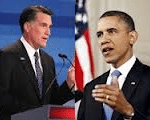The 2012 Presidential Debates: When Moderators Aren’t Moderate
 Lost in the sea of coverage following Mitt Romney’s selection of Paul Ryan as his running mate, was the news that the moderators for the three Presidential debates, and one VP debate, were also selected.
Lost in the sea of coverage following Mitt Romney’s selection of Paul Ryan as his running mate, was the news that the moderators for the three Presidential debates, and one VP debate, were also selected.
There is a certain kind of news one receives that falls into the category of “this may or may not be bad—but it can’t be goodâ€. For Republicans, learning of the moderators that will be at the helm for these four debates certainly earns this distinction.
In order of appearance they are- Jim Lehrer (PBS News Hour), Martha Raddatz (VP Debate-ABC News), Candy Crowley (CNN), and Bob Schieffer (CBS News).
Since the Romney campaign had to sign off on each moderator, it is hard to imagine that they could not have demanded better (even given that the Obama camp also had to sign off on each). By any measure, Jim Lehrer, Candy Crowley, and Bob Schieffer all lean to the left, and the networks that employ them all trail badly in the ratings to their direct competition.
Even if you were to say that these three were the fairest that both sides could agree to, giving a green light to Martha Raddatz for the VP debate was certainly inexplicable. The reason for this being, she is a “foreign affairs correspondent†which is not Ryan’s forte, and in fact he was brought into the race for his economic mastery. One has to wonder how much focus will be put on non-domestic topics just based on her area of expertise. On the surface this seems a major concession to the Obama campaign, and one that needed not be given.
The reason these moderators are so important is three-fold. First, with all the polls showing that the election has a likelihood of being razor-close, every small detail that goes into them has a chance to be huge. Second, like was the case with the Republican Primary debates, these four showdowns will smash records for viewership and the audience will include millions of Independents sizing up the candidates for the first time. Lastly, and most importantly, the questions asked of the candidates have the ability to dominate the crucial weeks of news cycles leading up to Election Day.
So What Should The Focus Be?
Poll after poll shows that for the American people ground zero in this election is the economy. A Pew Research Poll taken from June 7-17 asked voters to name the top issue that they will be considering in the voting booth in November. The top four answers were Jobs (35%), the Budget Deficit (23%), Health Care (19%), and Social Security (11%).
The danger in having biased moderators was on full display for the Republican Primary debate moderated by George Stephanopoulos, when, seemingly out of nowhere, he felt the need to drill down with Mitt Romney and Rick Santorum on the issue of female contraception. This gave birth (no pun intended) to the Sandra Fluke phase of the campaign and a multi-week sidetrack by the media away from the serious issues of the day. There is simply no doubt that, should they choose to, a moderator can actively push the focus to issues that are not widely being considered by voters—and into territory that favors one candidate or another.
As will be the case in October, it just so happens that the issues voters themselves say are paramount are the exact issues that President Obama is desperate to avoid talking about. In theory this would make the debates a huge opportunity for Romney and Ryan to drive home their message—something tells me it won’t quite go down that way.
Perhaps I will be proven wrong, but will these moderators have the gumption to ask President Obama why a myriad of the promises he made while running in 2008 have been unachieved or even un-attempted? Will they remind the American people that twice the President had budgets voted on by Congress, and he failed to receive one solitary vote for either of them? Will they ask why he promised to cut the deficit in half but instead oversaw three years of trillion dollar plus deficits? Or will they inquire why he has not laid a plan on the table for reforming entitlements, after saying himself this was crucial in 2008?
Republican Are Right to Be Nervously Skeptical
All things being equal, and according directly to the polls, the topics discussed during all four of the debates should almost exclusively be jobs, the deficit, the long term health of entitlement programs, and foreign policy. What I fear instead is painful subjection to multiple questions on gay marriage, abortion, contraception, and student loan debt— knowing all the while the fruit is rusting on the vine.
It is true that the level of professionalism that the four moderators will show is yet to be determined, and perhaps at least three of them will be fair (I hold no hope for Bob Schieffer). But given the track record of behavior the major media outlets have shown to Republicans in recent years, I’d say a mildly-crippling nervousness is more than justified.
After all, barring a phenomenal performance by both Republican candidates, one thing is certain—“it may or may not be bad…but it won’t be goodâ€.
The post The 2012 Presidential Debates: When Moderators Aren’t Moderate appeared first on The Conservative Reader.
